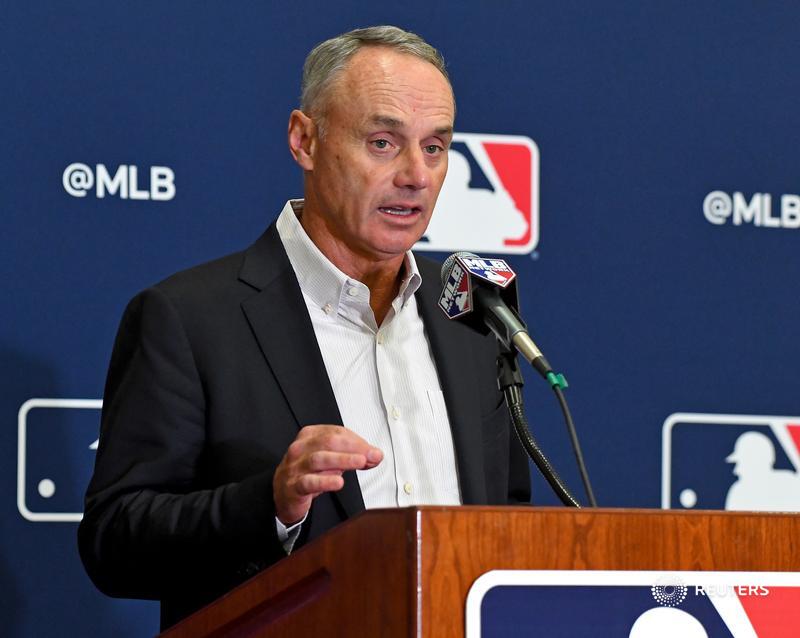

Baseball, the sport that famously ignored time, has suddenly become obsessed with it. Recently, MLB saw a radical shift in the game’s rhythm with the introduction of the pitch clock by Commissioner Rob Manfred. This controversial switch, designed to shorten games and inject more action, has fans and players alike buzzing with debate. But why was it necessary?
Watch What’s Trending Now!
Long gone are the days of pitchers taking their sweet time and batters leisurely adjusting their gear between pitches. The pitch clock forces players to act decisively (or face an automatic ball or strike). This rule change is directly aimed at eliminating the dead time that can make baseball a test of patience. Has this change altered the very fabric of America’s favorite pastime—or was this shake-up long overdue?
ADVERTISEMENT
The Introduction: When and why was the pitch clock introduced in the league?
The 2023 Major League Baseball season debuted a controversial rule change: the pitch clock. This shift was sparked by a desire to modernize the game, shorten its length, and boost its action-packed appeal. Commissioner Rob Manfred has long been vocal about his concerns with the length of baseball games. As a CBS Sports report notes, MLB is focused on streamlining the experience—reducing the downtime, not the game itself. But what exactly does the clock entail?
the effect of mlb’s pitch clock & other game changes, graphed: pic.twitter.com/yjFz4Z1Umd
— ian bremmer (@ianbremmer) June 2, 2023
The pitch clock brings strict new rules: 15 seconds with bases empty, 20 with runners on. The clock starts ticking the moment the pitcher has the ball, and hitters must be ready in the box with 8 seconds left. Miss the deadline? That’s an automatic ball for the pitcher and an automatic strike for the batter. Pitchers also have limited “disengagements”—those pesky pickoff attempts or steps off the mound—to keep things moving.
ADVERTISEMENT
This forces a sense of urgency that simply wasn’t present in the sport before. The aim is to eliminate those long pauses between pitches. So, why shake up tradition?
Top Stories
Blue Jays’ Cody Bellinger Stance Confirmed as Ross Atkins Risks Losing Multiple Players, Deems Insider

Blue Jays Moves to Sabotage Yankees’ Cody Bellinger Plans as Ross Atkins Scrambles to Fix Kyle Tucker Misstep: Insider

Cody Bellinger’s MLB Future All but Confirmed as Yankees, Mets Lock Horns in Mega Battle, Per Insider

Blue Jays & Ross Atkins Face $168M Dilemma After Vladimir Guerrero Jr.’s Honest Message to Bo Bichette

Yankees “Future Shortstop” Gets Real About Replacing Anthony Volpe

Read More: Rob Manfred’s MLB Journey: A Boon or Bane for Baseball?
ADVERTISEMENT
It boils down to baseball’s fight for a place in the fast-paced modern entertainment landscape. Games have been getting progressively longer—a trend MLB is determined to reverse. The pitch clock is an attempt to inject a more dynamic feel for new and existing audiences. It has certainly created a buzz of controversy, and players and fans alike are adapting to its demands. Does it truly elevate the game, or could it be doing more harm than good?
How has pitch clock impacted the game?
It’s not just about shorter games anymore—though MLB has shaved off a hefty 30 minutes on average by introducing the pitch clock. Market reports point out a less-discussed revolution: games are astonishingly predictable in length. No more marathons or late-night thrillers for East Coast fans—baseball now fits neatly into time slots. And this change is striking for several reasons.
ADVERTISEMENT
MLB's implementation of a pitch clock has already had a serious impact on game length, with the Mets' first three spring training games all coming in well under 3 hours. Their average game length last season was 3 hours and 10 minutes.
Are you a fan of the pitch clock? 🤔⏱️ pic.twitter.com/ExWwqMEEyU
— SNY Mets (@SNY_Mets) February 27, 2023
Games haven’t been this consistent in duration for over a century! While the zombie runner rule (extra-inning baserunner) did contribute, the clock has forced even the slowest of players to move with urgency, bringing about a factor of unforeseen benefit: predictability.
For decades, baseball’s unpredictable timing was seen as a barrier to its broader appeal. As far back as 1969, articles like “Can Baseball Save Itself?” lamented this as a turn-off for networks. MLB’s new on-time dependability is a hidden win for the league.
ADVERTISEMENT
Sure, some fans will miss those occasional ultra-long spectacles of endurance. And with shorter, standardized games, the sport has lost a bit of its quirky charm. But in a world where every other media product broadcasts its duration, was baseball’s change truly a sacrifice or a necessary adaptation? It is evident that baseball is no longer the time-bending anomaly it once was. Is that a good thing? Let’s hear what players and coaches are saying…
ADVERTISEMENT
Players and Coaches outlook: Voices in favor vs. Voices against
MLB’s pitch clock might be one of sports’ most divisive changes brought in by Rob Manfred, but it hasn’t been without its supporters within the game itself. “I think it’s helping defensively a lot,” said Mariners’ baseman Kolten Wong, citing the faster pace keeping fielders engaged.
Legendary skippers like Chicago Cubs’ Craig Counsell argue that the clock lessens the mental strain on fielders during long, stagnant innings—“It’s definitely not something I’d thought of, but I think it’s easier to play defense now the way the game is structured because it’s just faster-paced.” The proof may be in the numbers, as fielding percentages league-wide are at historic highs. And there’s the added flow factor.
MLB Commissioner Rob Manfred on the pitch clock:
"We see it as a huge success. Our attendance was up 9.6%, it's the biggest increase in 30 years. We feel like we're putting the best form of baseball on the field."
(via @TheCartonShow)pic.twitter.com/OWKVcYZfOT
— FOX Sports: MLB (@MLBONFOX) October 26, 2023
ADVERTISEMENT
The clock isn’t just about shorter games; it’s about a changed rhythm. “There’s more action,” notes Seattle Mariners’ manager Scott Servais. “Things are happening quicker, less standing around.” Without the lulls, some believe the natural excitement of baseball is heightened.
Infielder Owen Miller sees the clock as a positive, too: “You just have less time in between pitches, so…infielders are a little bit lighter and quicker on their feet.” Arizona Diamondbacks’ outfielder Alek Thomas concurs, suggesting the clock forces everyone to be constantly prepared, potentially favoring more agile players.
However, some believe that the pitch clock eliminates a stall tactic employed by certain hurlers. Proponents argue that deliberate pitching is a skill, not simply a way to delay the sport.
ADVERTISEMENT
Read More: After Anti-Pitcher Move Earlier This Year, ‘Man Who Hates Baseball’ Finally Moves in Their Favor
“It messes with the fabric of the game,” believes Texas Rangers’ veteran pitcher Max Scherzer. Others, like superagent Scott Boras, worry those iconic playoff moments of high-stakes tension will be lost. “They need to reflect; they need more time,” he insists. Some see it as pure marketing, claiming the solution isn’t forcing a faster game but teaching fans to appreciate the “hidden” action. But was all this controversy really needed?
The Analysis: Was it needed?
Pace of play has long been a hot-button issue in baseball. But was the pitch clock, with its automatic strikes and balls, really the solution? The early results are… mixed. Games are faster; Spring Training contests in 2023 reportedly averaged 23 minutes less than in 2022! Yet this speed comes with a nagging worry: will dramatic moments, like a walk-off with the bases loaded, end not with a swing but with a stopwatch?
For purists, the clock feels like marketing, not baseball. One might argue that the game’s slower pace is where its true charm lies, allowing for the mental battle between pitcher and batter to fully play out. Many believe that teaching new fans to see the existing action is a far better solution than artificially changing the game itself.
MLB just announced a rule change to the pitch clock violation, thanks to the Jansen vs Contreras at bat. pic.twitter.com/M6yfmzGvtb
— Boston Strong (@BostonStrong_34) May 17, 2023
The clock’s detractors already have a Spring Training horror story tied to it; there was a game back on February 25, 2023, that ended in a tie on a clock violation walk-off. It is speculated that crucial regular season and even playoff games may hinge on such technicalities. Pitchers like Zack Wheeler of the Philadelphia Phillies dislike feeling rushed, while in-person fans may find the faster pace cuts into concession time. But the question still looms—was it even necessary?
Some reports argue that the rule was a solution to a problem that didn’t exist. Games had naturally sped up even before the changes took effect. Plus, doesn’t baseball’s inherent lack of a clock make it unique amongst major sports? So what is the verdict?
Read More: What is a Pitch Clock? How Did It Change After the 2023 MLB Season?
Whether Commissioner Rob Manfred’s pitch clock rule ruins the game or revitalizes it will depend on how fans react as the seasons progress. Traditionalists may need to accept some change, while advocates of the modern landscape should hope those dramatic, timer-fueled endings become the stuff of legend, not controversy. Love it or hate it—the pitch clock rule is a definitive part of the game now. The only way to measure its true impact is to give it time to play out.
ADVERTISEMENT
ADVERTISEMENT
ADVERTISEMENT